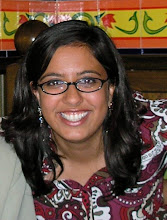Last week, I finally finished reading The Lexus and the Olive Tree, Tom Friedman's globalization manual that preceded The World Is Flat. I initially started reading it during freshman year, but, having no tolerance for economics, the introduction's lengthy explanation of the 1997 Asian financial crisis turned me off the book very quickly. I rediscovered it while perusing my bookshelf at the start of winter break and decided to give Friedman another try. After begrudgingly accepting that economics is a significantly important part of international relations, and I should probably stop ignoring it and instead try to understand it, I was determined to decode the eco-speak. After a two-hour conversation with Papa about how exactly the global financial system worked, I was ready to read the book.
After reading The World is Flat and thoroughly enjoying it, certain parts of this book seemed repetitive. Friedman's corny habit of naming every concept he explains, calling people left in the technological dust "turtles," instructing states to put on the "Golden Straitjacket" of capitalism, and watch out for the "Electronic Herd' of global investors, which comprises "short-horn and long- horn cattle," elicited more than one eye-roll from me, but it was entertaining and hey, it kept me reading. At times, Friedman's conversational tone and use of exclamation points irked me and I got the impression that some things were oversimplified, but for its purpose as an introductory crash course in globalization, the book worked.
The thing that struck me most while reading, though, was what a difference seven years makes. Although 2000 doesn't seem that long ago, reading the book made it obvious that a lot can change in that span of time. Friedman often quoted Larry Summers, who I only knew as the guy who made the sexist comments at Harvard, and mentioned Enron and Kenneth Lay multiple times. In the wake of the scandals that embroiled these two, I wonder if, as he looks back at this book, Friedman regrets referencing them so much.
But most of all, reading this book made it very clear how much of an impact Sept. 11 really had on the state of the world. While before everything revolved around technological advancement and economic development, now, virtually no decision is made without the lens of terrorism in front of it. It was weird, but reading the chapters on globalization's impact on other parts of the world, and the resulting backlash, made it easier to see how much 9/11 changed the way we view the world. He warns us about Super-Empowered Angry Men who could potentially use globalization to their advantage and lash out like never before. The passage on the 1993 World Trade Center bombing was just downright eerie to read:
"Ramzi Yousef is really the quintessential Super-Empowered Angry Man. Think about him for a minute. What was his program? What was his ideology? After all, he tried to blow up two of the tallest buildings in America. Did he want a Palestinian state in Brooklyn? Did he want an Islamic Republic in New Jersey? No. He just wanted to blow up two of the tallest buildings in America. He told the Federal District Court in Manhattan that his goal was to set off an explosion that would cause one World Trade Center tower to fall on the other and kill 250,000 civilians. (402)."
And sentences like, "America's Golden Straitjacket is producing enough gold - with a substantial budget surplus projected into the new millennium - to afford both social safety nets and trampolines [benefits to those burned by the globalization's search for the bottom line.] (450)" and just made me shake my head and think, "Not anymore Mr. Friedman, not anymore." And while it may be true that our military superiority means we can "project more power farther than any country in the world. And deeper too," that really hasn't done us much good since 2003, now has it.
I'm not saying Friedman shouldn't have written things like this; after all, hindsight is 20/20. It's just interesting to see how something that seems to be relevant and applicable just isn't sometimes. By the end of the book though, I still felt like I'd gleaned some valuable insight into the new world structure and power order, and even an understanding into what drove the world to the way it is now, post-9/11 and all.
Monday, December 31, 2007
Subscribe to:
Post Comments (Atom)





No comments:
Post a Comment